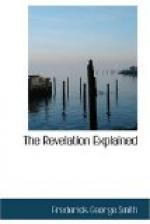Now, if the contents of the sealed book were (at the time of this vision) only the history of events to be, why was it that no man on earth or in heaven, nor even an angel before the throne, was found worthy to “look into” it or to communicate its secrets to the children of men. Gabriel was sent as a worthy messenger to communicate to Daniel a long series of future events reaching even until the end of time. But the contents of this roll were such that no created intelligence of earth or heaven was able to unfold them. All remained unfathomable mystery—until Christ stepped forward in his character as a sacrificial Lamb and declared himself able to undertake the task of loosing the seals and of opening the book. “Unto you it is given to know the mystery of the kingdom of God” (Mark 4:11), he said to his disciples, “even the mystery which hath been hid from ages and from generations, but now is made manifest to his saints.” Col. 1:26. “Verily I say unto you, That many prophets and righteous men have desired to see those things which ye see, and have not seen them; and to hear those things which ye hear, and have not heard them. Blessed are your eyes, for they see; and your ears, for they hear.” Mat. 13:17, 16.
The fact that the suffering and death of Christ was a past event at the time when the Revelation was given does not constitute a valid objection to the position taken, that the contents of the sealed book embrace the plan of redemption during the entire period of its operation; for the reason that, in order to form a complete and continuous narrative, past events are frequently referred to in the Apocalypse. Thus, John saw a beast with seven heads signifying seven kings; but he was expressly informed that “five are fallen, one is [exists at present], and the other is not yet come.” Chap. 17:10.
When Christ appears on the symbolic stage, he is introduced by the elder as “the Lion of the tribe of Juda,” and “the Root of David.” The lion, being the king of beasts and the monarch of the forest, is indicative of power, such as Christ possesses. Christ is elsewhere denominated “King of kings and Lord of lords,” and he himself laid claim to “all power in heaven and on earth,” it having “pleased the Father that in him should all fulness dwell.” Why he is termed “the Lion of the tribe of Juda,” I am unable to say, unless the expression is borrowed from the prophecy recorded of him in Gen. 49:10—“The sceptre shall not depart from Judah, nor a lawgiver from between his feet, until Shiloh come; and unto him shall the gathering of the people be.” His being the “Root of David” shows that he is the source and sustainer of David as to his position and power. David was specially ordained of the Lord and sustained by him. Of this there can be no doubt. David was a type; Christ is the antitype. David’s position as ruler over natural Israel constitutes a type of Christ’s position as ruler over the spiritual Israel; and it




